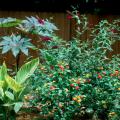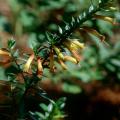News From 2002
MISSISSIPPI STATE -- Mississippi's 2002 cotton crop may not be experiencing the drought challenges of past years, but the variable conditions are not making this an easy crop to predict either.
"The state's crop is at a varied stage of development due to an extended planting season," said Will McCarty, cotton specialist with Mississippi State University's Extension Service.
"Instead of the normal five to seven weeks of planting, it took eight to nine weeks. That's longer than we would like to see."
MISSISSIPPI STATE -- Researchers at Mississippi State University are betting that one day state producers will want to grow seedless watermelons, and when they do, MSU will be ready to help them grow the best ones possible.
By Norman Winter
MSU Horticulturist
Central Mississippi Research & Extension Center
The Outback Sunset lysimachia has surpassed my greatest expectations. Although several people predicted problems from Mississippi's afternoon summer sun, I had the perfect location that afforded shade after 2 in the afternoon.
MISSISSIPPI STATE -- Eight girls from a group home in West Point spent a week with horses as part of a therapy program hoped to be the first of many offered around the state.
Mississippi State University's Horse Park hosted FOCUS, a day camp from July 15 to 19 designed for girls age 12 to 17 for "Finding Out about Communicating, Understanding and Succeeding."
MISSISSIPPI STATE -- Mississippi's livestock producers are looking forward to adequate pasture grass and hay supplies going into the fall, leaving only one thing to worry about: cattle prices.
John Anderson, agricultural economist with Mississippi State University's Extension Service, said Mississippi livestock producers pastures are better than normal for this time of the year, unlike their counterparts' pastures in major cattle producing states such as Texas and New Mexico.
JACKSON -- Mississippi 4-Hers will culminate their organization's year-long centennial celebration from 7:30 a.m. until 5 p.m. on July 20 at the Agriculture and Forestry Museum in Jackson.
MISSISSIPPI STATE -- Robert Rogers, Mississippi State University professor, recently served as an editor and author of "Meat Science and Applications," a professional reference guide for government, industry and academia.
By Norman Winter
MSU Horticulturist
Central Mississippi Research & Extension Center
The castor bean, one of the South's best old-fashioned plants, really starts to attract attention this time of the year. The castor bean is undergoing a revival of sorts -- not only showing up in the rural cottage gardens but also in places like Northpark Mall in Jackson.
The castor bean has been grown in the United States for a long time but comes from northeast Africa. It is in the Euphorbia family, making it related to poinsettias and copper plants.
By Charmain Tan Courcelle
MISSISSIPPI STATE -- That raw oyster appetizer might sound tempting, but you may want to consider eating it later in a meal.
Mississippi Agricultural and Forestry Experiment Station food microbiologist Douglas Marshall has found eating raw oysters on an empty stomach can increase the risk of food poisoning. And taking an antacid beforehand could make the situation even worse.
MISSISSIPPI STATE -- The open road beckons many teen drivers to throw caution to the wind, making the summer months the most deadly time of the year for these youth.
According to the National Highway Traffic Safety Administration, 16-year-old drivers are at the most risk of dying in traffic accidents. Speeding, alcohol use, multiple passengers and driving between midnight and 3 a.m. represents the deadliest combination of risk factors for these young drivers.
By Eva Ann Dorris
MISSISSIPPI STATE -- Mississippi's estimated planted acreage for 2002 reveals some significant swings between cotton and soybean acreage, but those changes appear more the result of weather, commodity prices and available financing than the new Farm Bill.
By Norman Winter
MSU Horticulturist
Central Mississippi Research & Extension Center
The popularity of Mexican Heather exploded in the 1980s, and this plant, also known as false heather, is still an excellent choice. Other species and varieties from Mexico are tough, good looking and unique enough to possibly interest your children or grandchildren in gardening.
MISSISSIPPI STATE -- With most of Mississippi's soybean crop in bloom, it's time for farmers to think about making late-season management decisions.
Alan Blaine, soybean specialist with Mississippi State University's Extension Service, said growers need to check to see if fields need late-season insecticide or fungicide applications.
By Norman Winter
MSU Horticulturist
Central Mississippi Research & Extension Center
An old-fashioned plant at the New Orleans Botanical Garden recently just blew me away with its beauty. It was an old cosmos variety called Sensation. Cosmos are native to Mexico and related to coreopsis and rudbeckias.
MISSISSIPPI STATE -- Schools get the blame when a child can't read at a young age, but experts say literacy begins in infancy.
Louise Davis, child and family development specialist with Mississippi State University's Extension Service, said the ability to read and communicate actually begins before birth.
MISSISSIPPI STATE -- Hot weather, sunshine and long days without school invite young people outdoors, but play can turn dangerous if adults don't provide proper supervision.
According to the National Safe Kids Campaign, nearly 3 million children ages 14 and under are taken to emergency rooms each summer for serious injuries. More than 2,500 of these children die from their injuries.
MISSISSIPPI STATE -- Changes in clientele needs, technological advances and tighter budgets are prompting a major restructuring of the Mississippi State University Extension Service.
Joe McGilberry, director of the MSU Extension Service, said in-depth plans for restructuring have been developing for more than a year. The plans will enable the Extension Service to continue to deliver quality educational programs and assistance throughout the state.
MISSISSIPPI STATE -- April rain interrupted rice planting and will create two rice harvests a few weeks apart, but both crops appear to be doing very well near mid-season.
Joe Street, rice specialist at Mississippi State University's Delta Research and Extension Center in Stoneville, said most of the state's rice was planted in April, but rains delayed the rest until May.
MISSISSIPPI STATE -- Scientists at Mississippi State University are counting corn borers to see why the numbers are so high and to determine better ways to control the pests.
Don Parker, entomology specialist with Mississippi State University's Extension Service, said monitoring for the Southwestern corn borer has intensified this year. The corn pest has become a bigger problem in recent years as Mississippi farmers are planting more corn.
By Jeanie Davidson
MISSISSIPPI STATE -- The quality and quantity of Mississippi's melon crop this year may have depended in part on growers' use of irrigation.
Many growers in Greene County, one of the state's leaders in fruit production, use irrigation and black plasti-culture to produce melons. These costly and time-consuming techniques help prevent sunburned or misshapen melons and accelerate harvest by about two weeks, but growers need higher sale prices to offset the expense.
Pages
News Types
- Crop Report (423)
- Feature Story (5867)
- Feature Photo (53)
- Extension Outdoors (318)
- Southern Gardening (1446)
- Extension Inbox (95)
Archive
- 2024 (170)
- 2023 (182)
- 2022 (187)
- 2021 (177)
- 2020 (212)
- 2019 (223)
- 2018 (276)
- 2017 (338)
- 2016 (383)
- 2015 (457)
- 2014 (498)
- 2013 (490)
- 2012 (492)
- 2011 (356)
- 2010 (323)
- 2009 (313)
- 2008 (273)
- 2007 (263)
- 2006 (252)
- 2005 (278)
- 2004 (273)
- 2003 (279)
- 2002 (228)
- 2001 (238)
- 2000 (243)
- 1999 (233)
- 1998 (232)
- 1997 (239)
- 1996 (58)
- 1995 (36)




